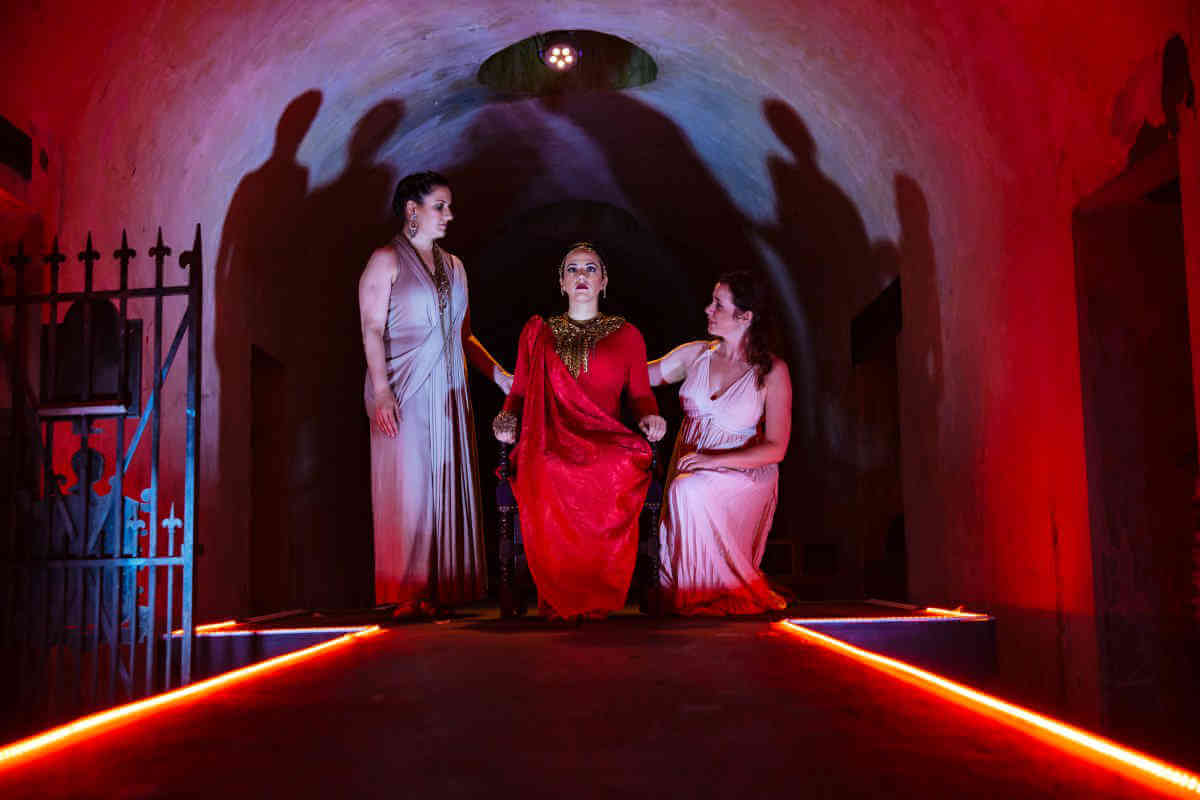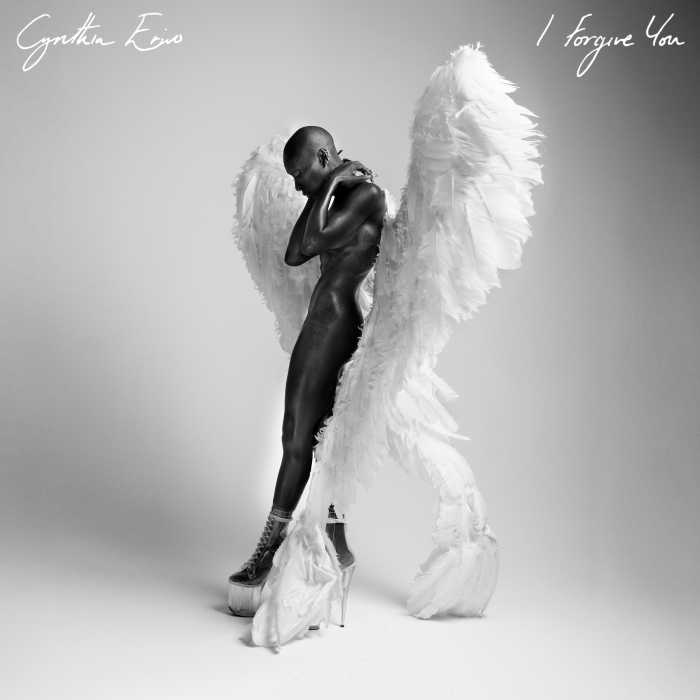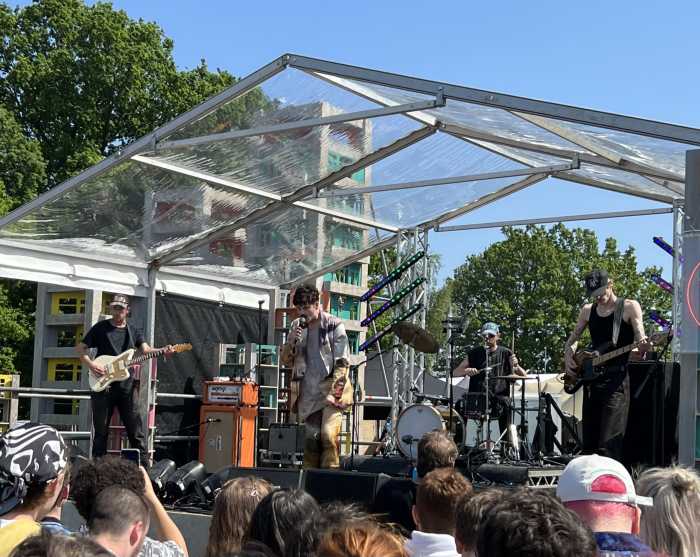The music series “The Angel’s Share,” imaginatively and wittily curated by producer Andrew Ousley, uses an extraordinary venue: the mid-19th century Catacombs cut into Brooklyn’s iconic Green-Wood Cemetery, which affords extraordinary atmosphere plus terrific views of Manhattan. The Catacombs’ long space has a — sorry! — haunting acoustic, which imparted mystery to harpsichordist and conductor Elliot Figg’s five-piece string ensemble in Purcell’s “Dido and Aeneas” (seen June 5).
The iconic opera got an intelligent, visually inventive if slightly overbusy staging from tenor Alek Shrader. Talented dancer Liana Kleinman too often grabbed focus, as if channeling the Falcon in Herbert Wernicke’s production of “Frau ohne Schatten”. Shrader added in pertinent passages from Marlowe’s 1593 “Dido, Queen of Carthage” — not strictly necessary but not a bad idea either. This swelled the named cast members to include Iarbas, Dido’s local suitor, and Anna, her sister (who took Purcell’s Second Woman’s music). Despite resonant voices, neither performer spoke the verse easily, and giving the overlooked Anna an Elettra-style Mad Scene derailed the central tragedy’s pace.
I’ve now seen Daniela Mack — a real chameleon onstage — convincingly inhabit Handel’s Bradamante (“Alcina”) and Rosmira (“Partenope”), Siebel, Berlioz’s Beatrice, Carmen, and the murderous title role of Kevin Puts’ “Elizabeth Cree.” Her Dido was equally stylish from the musical point of view as well as thoughtfully and effectively performed from a dramatic perspective. She declaimed the Marlowe lines with more impact and nuance than her colleagues and sang Purcell’s remarkable music with tonal variety and beautiful phrasing. A striking figure in Fay Eva’s red dress and jewelry, she rightly dominated the proceedings. So far, the Met has utilized her manifest talents only as the Kitchen Boy in “Rusalka,” with Varvara in “Kat’a Kabanova” on deck next season. Luxury casting! Opera Philadelphia recognizes Mack’s artistic worth more fully, presenting her next season as Juno/ Ino (“Semele”) and in Verdi’s “Requiem.”
The two other female leads, gifts to strong performers, were strongly vocalized and acted in complementary fashion to Mack’s proud, impassioned Dido. Molly Quinn showed well-honed baroque style in Belinda’s coruscating music, and Vanessa Cariddi dug richly into the oft-caricatured music of the envious, destructive Sorceress. Aeneas has little music. Paul La Rosa looked suitably heroic and romantic; it’s a fine voice, but he tended to roar operatically in the confined space. Stylish, deft contributions came from Marc Molomot’s Sailor and Erin Moll’s Wayward Sister. Keep your eyes open for news of “The Angel’s Share” future emanations: this “Dido” proved a memorable evening.
As part of music director’s Jaap van Zweden Beethoven-centered “Music of Conscience” mini-festival, the New York Philharmonic unveiled “prisoner of the state” by David Lang: his 13th stage work, and not his first effort to enter into dialogue with an existing canonical work. This well-intentioned co-commission retells “Fidelio” employing none of Beethoven’s music and omitting Marzelline, Jacquino, and — perhaps most significantly — Don Fernando, the deus ex machina Justice Minister.
Elkhanah Pulitzer’s well-judged staging, effectively blocked and successfully employing video, took place around the orchestra. The male chorus (Donald Nally’s Concert Chorale of New York) was excellent in clarity and tone as the prisoners (on a platform behind and above the players). The equivalent of Beethoven’s “O welche Lust” proved the most compelling — indeed, the only moving — segment of Lang’s 70 minute-long score. His libretto is insistently “plain-spoken” to the point of mannerism. The composition — more memorable for rhythm than for melody — is highly professional, tidily handling in Brittenesque fashion one musical motive in each segment. Though van Zweden’s guidance of his players proved clear, the orchestration sometimes covered the vocal soloists. Also, Mark Grey’s sound design was over-resonant and the black-and-white video of lyric baritone Jarrett Ott’s Prisoner distractingly out of synch with the beautifully phrased legato sounds he produced, Jokanaan-like, from an understage trap door. (The hunky Ott and childlike Julie Mathevet seemed improbably young to be an established ‘prisoner of the state” and his long-term wife.)
As the Assistant — the Leonore figure — Mathevet was puzzlingly miscast: audibly not an Anglophone, she distorted vowels in both dialogue and song. Plus, her tiny high soprano — she is a frequent Yniold — only carried atop ensembles. Elsewhere she sounded — when audible over Lang’s heavily percussive orchestration — like a flatting boy treble. His bass-baritone in good estate, Eric Owens’ strong presence and clear diction served him well as The Jailer. Alan Oke also evidenced effective stage presence as the sinister Pizarro figure, but his incisive tenor is now somewhat decayed tonally, suitable for Musorgsky’s Shuisky but not always firmly produced here.
An example of the piece’s Brechtian dramaturgy: when The Assistant fires her gun at The Governor, the lights fade, and he takes the gun, the moment has a lyrically cynical, cello-accompanied monologue about the futility of action (“What is one man?”) heavily evocative of Jimmy Mahoney’s pre-execution reverie from “Mahagonny.” Lang’s final chorus, delivered by all the participants to the audience, suggests the same operatic source (and the same skepticism about rescue or amelioration). Much must be said about the injustices of mass incarceration in the United States and elsewhere, but — whatever its beneficent intentions — this ultimately unaffecting piece did not express it either musically or dramatically.
One last chance to hear the superb Met Orchestra before the summer came June 14, when at Carnegie Hall Yannick Nézet-Séguin led the gorgeous-voiced mezzo Elina Garanca through Mahler’s five “Rueckert-Lieder” — not a cycle but a group of poems by the same writer. Mahler brilliantly orchestrated four; after his death, conductor Max Puttmann tackled the fifth, “Liebst du am Schoenheit,” a wedding gift/love token to the composer’s legendarily fickle bride Alma. Coping with a recent injury that caused her some canceled bookings, Garanca was brave to perform at all, and — taking a song to warm up — sang extremely well, with a wide dynamic palette, pillowy legato, and refreshingly accurate attack throughout a considerable range. Once again, the Latvian artist worked with a music stand, but was less visually wedded to it than at her October Carnegie recital. Some crisper consonants might have helped, but she sang with feeling in gratifyingly long phrases. There are deeper probing artists, but few more beautiful instruments around these days; and the instrumental solos — oboe, flute, bassoon — proved superb.
After a memorably mellow “Ich bin der Welt abhanden gekommen,” my guest and I fled, not wanting to endure, however well-played, Bruckner’s emptily bombastic Seventh.
On June 27 in the Upper East Side’s Church of the Heavenly Rest, Will Crutchfield’s Teatro Nuovo program concentrating on promulgating and investigating bel canto gave an impressive “calling card” performance out in front of their Bellini and Rossini opera offerings later this month at Purchase and in Lincoln Center’s Jazz Theater. Crutchfield led the fine period instrument band in Donizetti’s “Symphony in E Minor,” reconstructed by Gabriele Dotto with the fourth movement deftly scored by Crutchfield. A very enjoyable piece, to my ear it suggested the influence of Donizetti’s Bavarian-born teacher Johann Simon Mayr, with its echoes of Weber and an adagio second movement evoking Beethoven in celestial mode.
Then the ensemble, under the highly organized conductor Jakob Lehmann, offered Rossini’s influential “Stabat mater,” deploying many of the program’s young artists to alternate the S/ M/ T/ B solo work. We heard five sopranos, five mezzos, four tenors, and five basses or bass-baritones. All evidenced vocal talent worth pursuing and some grasp of bel canto style — tough learning that takes time. For example, none of the striking-timbred lower-voiced men showed full evenness of vocal production. There were very exciting contributions from the leads of the upcoming “La Straniera,” luminous soprano Christine Lyons and ringing tenor Derrek Stark. But the mezzos took the collective palm, all displaying memorable personal timbres and technical accomplishment. They were SarahAnn Duffy, Amanda Fink, Allison Gish, Maya Gour, and Hannah Ludwig, who takes the key role of Pippo in “La gazza ladra” where the rich-voiced Gish also appears.
David Shengold (shengold@yahoo.com) writes about opera for many venues.



































